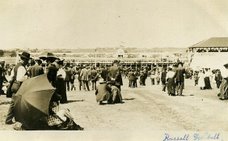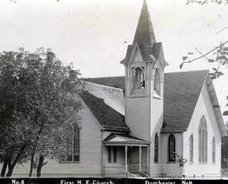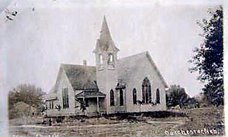 This article was originally published by the Dorchester Times in October 2007. Some of the reader comments are from that year.
This article was originally published by the Dorchester Times in October 2007. Some of the reader comments are from that year.The Economist magazine recently published an article on small town revival.
In an article entitled "America the Creative," a bleak picture is painted for many small rural towns across America:
"Most small towns are still struggling, as a tour of boarded-up main streets and closed John Deere dealerships in the rural heartland will show. Out-migration has drained their populations over the past century. Agri-businesses have replaced small farms -- and shopping malls an hour away (not to mention Wal-Mart and the Internet) have undercut local shops. In many small towns only old people are for the most part left, as there is little to attract the young. Just 17% of America's population today lives outside metropolitan areas."
But the article goes on to document a handful of communities "deep in the boondocks" that are determined to beat off the doomsayers with creative ideas, including:
- Hidalgo, Texas decided to capitalize on its site in the migration path of the dreaded African killer bees. The town boldly erected a 20-foot (6 meters) long statue of a bee, made from fiberglass and steel, and was promptly dubbed the "Killer Bee Capital of the World." Soon, the tourists flocked.
- Colquitt,Georgia, population 1,900 and in one of the poorest parts of America, was revived by a storytelling festival known as "Swamp Gravy." In the early 1990s, someone had the bright idea of performing local folk-tales as musicals. Today, some 40,000 people come each year to the festivities, which are held in a converted cotton mill. Many new businesses have opened on the town square, and retail and restaurant sales triple when the Swamp Gravy show is on.
- Nelsonville, Ohio, has become an “artists Mecca” in recent years.
- Culbertson, Montana, whose population dropped to 714 in 2005, recently replaced its old oil-seed factory with a biodiesel plant that employs several dozen workers.
Another channel is philanthropy. Small towns can and should look for help from people with money. (Example: Dorchester area natives who have made it in Chicago, New York or even Omaha and Lincoln, as well as area farmers who've been blessed by the recent boon in commodities). In particular, the well-off should be encouraged to give not just to churches and libraries, but also to economic development.
The Times is interested in your economic development ideas for Dorchester.
What special events or attractions could we bring to our community? What other "outside-the-box" proposals should village leaders be exploring?
How can we to beat the doomsayers with our own creativity?


















































First, start by removing the whole idea economic development starts with business. It starts with people in small towns, straight up.
ReplyDeletePeople today need the small town just as much as the small town needs them. A primary focus should be to contact the like-minded people who want small town life for a place to live, and sell like hell.
The wealthy citizens of small town Americana have to take a chance on a new idea - new people are new opportunities. Finding them, and bringing them to your community should be priority #1.
I think this quote from the article is a good idea. "State aid for small entrepreneurs also helps. Montana, which has a notably populist governor, has been pushing especially hard. In its last legislative session, the state legislature made even the tiniest of businesses eligible for aid. But Chuck Hassebrook, executive director of the Centre for Rural Affairs in Nebraska, says it is expensive to provide small business development services in rural America, even
ReplyDeleteif there is a good return on investment. Rather appealingly, he proposes that the federal government shave 5% off its enormous farm-subsidy program—which goes mostly to mega-farms—and give it to small businesses. “You could quadruple what the federal government spends on entrepreneurial rural development,” he says."
Hey, D.C. Enough with your worshipping at the alter of big government. Do you really think "free money" from the feds is going to turn around small towns?
ReplyDeleteWe have about 550 towns in Nebraska with fewer than 2,000 people. Which ones will get what? Whatever happened to rugged individualism or pulling ones self up by your own bootstraps?? I like Caleb's idea of focusing on those who actually want to live here. I would argue that first we need a few selling points, such as new housing, an improved main street, or a new school (oh wait, we have one of those coming...)
In Sutton they have formed an economic development council. Sutton's current population is 1440. Their goal is to reach 2000. They aren't focusing on luring some big business. They know that will never happen. Instead they are focused on retaining youth (teaching them entrepreneurial skills) and bringing back alumni with families. It's working according to the folks I've spoken to.
ReplyDeleteI think Dorchester needs to do something like this. I also think Dorchester could host an annual event, such as street dance fesitival or three-day farmers market. I guarantee those would bring visitors to town, all of who would support the other businesses.
West End,
ReplyDeleteI like your thinking. Set realistic goals, such as Sutton. 1440 to 2000 adds to the health of the community, but does not outgrow their infrastructure.
The challenge here is that Dorchester's utilties, streets etc. will not support growth. This is made even more difficult with the downturn in the housing market, which will most likely get worse. However proximity to eastern Nebraska is good.
In the article the towns that have grown have found something creative and/or unique. Something that helps people create a meaningful, dare I say romantic experience, that makes them want to go back or move there. It seems that Wilber has capitalized on the Czech culture, what about Dorchester?
Well...........as Jack Benny used to say. Isn't rugged individualism a myth in much of the Great Plains? Beginning with the Homestead Act, rural electrification and farm subsidies, I don't think any of us really did it alone. If the government is going to send subsidies our way, why not do it in a manner that encourages entrepreneurship.
ReplyDeleteHere is a website for Palouse, Washington, a small town near where I live that has done it right:
ReplyDeletewww.visitpalouse.com
Agriculture is still the #1 employer and economic driver, but the residents have revitalized the community big time through unique businesses, arts, and events.
Check out their Halloween celebration. It brings thousands of people to town for a couple weekends a year. They've got two big haunted houses, a corn maze, food and drink stands, music, etc.. This could be done in Dorch....
Palouse is a bit unique in that it has a couple universities within 15 minutes, and the town has a bunch of resident artists, so factor that in.
It seems that if Dorchester would have a "cornerstone" event that it became known for (like the 4th of July) that drew in outside people, that would be a start.
Speaking of cornerstones, how about a weekend festival next year before the school is torn down? Allow people to walk through the halls of the old schoolhouse one more time. Relive memories by allowing people to flip through school yearbooks dating back to 1927 or 1928. Bring the weekend to a close by opening the school's cornerstone to see what, if anything, lies inside.
ReplyDeleteIdea Kid - that is a nice idea. Many of the older residents (as well as younger) have many memories in the old school. These include attending and participating in atheletic events and school plays in the old gym.
ReplyDeleteTo truly revive Dorchester, it will take much more than a single weekend event. In addition, for Dorchester to thrive doesn't require significant changes to the infrastructure of the community (roads, houses, etc.), but rather a sustainable activity that will bring in outsiders to spend their money. Most examples of small towns that have come back (without the advantage of a strategic location) actually are "gimmick towns" (i.e., killer bees). Here is something Dorchester could do that has the potential to have a lasting impact. With its close proximity to Lincoln and its strong agricultural roots, Dorchester should do something like a weekly farmers market, but with a slightly different slant. In large cities throughout the US (including Omaha and Lincoln), foods certified as organic and "chemical free" are selling extremely well (look at the success of the chains Whole Foods and Wild Oats). Dorchester could easily capitalize on this by making themselves known as the place to come to buy such foods from the actual farmers. The town could work with farmers to provide a "fun" environment each weekend starting early summer and lasting through September. If the town has normal business expectations (that is, don't expect immediate success), I feel that they would find that within 2 - 3 years this would acquire a fairly large following. Good products + word of mouth (testimonials) = success. The success of such an event would bring in significant money to the community for a 3rd of the year.
Population increase will follow for the town if people feel that they are living in a progressive community that values diversity and is changing with the future.
Everyone has such great ideas! I encourage all to become members of DACA or other organizations to promote the Dorchester environment. It is hard for such a small group to do it all. Members with good ideas and a little free time would be great assets to any Dorchester organization.
ReplyDeleteSocializing in this manner makes for more constructive movements towards the betterment of OUR town, Dorchester, NE.
I have never been more proud to call Dorchester home.
I think the Farmer's Market idea is a winner. If it were done well the folks from the larger towns and cities may travel to our fine village each weekend. This could be accentuated with some other family activities such as camping. Perhaps a restaurant could make a go, or our tavern would grow. It would be seasonal, but it's a start.
ReplyDeleteI too think this is an awsome idea. Not only could there be fruits and veggies available but locally baked pies or breads. I have been to a few sales in the past and there sure are some good cooks in this town! Local artists could get in on this as well and sell some of there crafts too. We could have our own mini "haymarket" here in Dorchester. Not only would it benefit the farmers but would bring business to Sheryl's Resturant and The grocery store too! Good idea to think about this summer!
ReplyDeleteJust a side note: My Grandparents and Uncle have been coming from Omaha to visit me a lot lately in Dorchester. They finally let me know this last weekend it's not me they are coming to see it's this town!! They love hanging out and driving around and seeing the community. They recognize what a great town me and my family live in and what great people live here too.....so if you see a big red truck (or jeep) with Omaha plates and a crazy long haired hippie driving...wave and smile!
I readily admit I'm not smart enough to offer a cure for what ails our small community business districts. That said I promise you Dorchester would attract more young families from all over if it were to begin a new housing development (WITH PAVED STREETS) just north or south of town. Think about a nice rock-lined lake on that hilly terrain north of Dorch on Hwy 6... My family would be there in a heartbeat. Just saying.
ReplyDelete